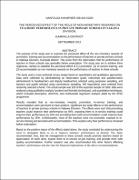| dc.description.abstract | The purpose of the study was to examine the perceived effect of the non-monetary rewards of promotion, training and accommodation on the performance of teachers in private primary schools in Nakawa Division, Kampala district. This arose from the observation that the performance of teachers in these schools was generally below expectation. The study was set to achieve three objectives, namely to establish the perceived effect of (1) promotion, (2) in-service training, and (3) accommodation as non-monetary rewards on the performance of teachers in these schools.
The study used a cross-sectional survey design based on quantitative and qualitative approaches. Data were collected by administering an observation guide, interviews and questionnaires administered to headteachers and deputy headteachers selected using purposive sampling, and teachers and pupils selected using convenience sampling. All respondents were selected from randomly selected schools. The actual sample was 525 of the expected sample of 1069. Data were analyzed using qualitative analysis (content and thematic techniques), and quantitative techniques, which included descriptive, ANOVA, and multivariate regression analysis aided by the SPSS programme.
Results revealed that as non-monetary rewards, promotion, in-service training, and accommodation were perceived to have positive, significant but weak effects on the performance of teachers in private primary schools in Nakawa Division. The effects were such that promoting teachers could improve their performance by 46%, exposing them to in-service training could improve their performance by 24% and providing them with accommodation could improve their performance by 26%. Unfortunately, most of the teachers were not promoted, exposed to inservice training and provided with accommodation. This explains why their performance remained below expectation.
Based on the positive nature of the effects stated above, the study concluded by underscoring the need to strengthen them so as to improve teachers’ performance as desired. The study recommended, thus, that the management in these schools should promote teachers based on appreciation of work done, expose them to in-service on-job training, and provide them with quality accommodation. Further research was also recommended into other factors affecting teachers’ performance and also into the financial implications of the above recommendations. | en_US |

